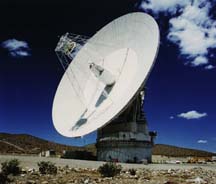Small-Body Radar Astrometry

Radar astrometry refers to measurements of an object’s position and and velocity normally made in a portion of the microwave frequency spectrum between 0.4 and 13.9 GHz.
A radar “delay” measurement is the elapsed time for a signal to travel from transmitter to receiver after reflecting off the target. “Doppler” is the frequency-change measured between receiver and transmitter after reflecting off the object, and is related to the net up and down-leg relative velocity of the object.
Inclusion of radar astrometry adds out-of-plane information orthogonal to optical RA/DEC plane-of-sky astrometry. It has high fractional precision, on the order of 10-9, measuring objects at the few-meter and millimeters per second level.
New data and updates will appear in this master database first; other sources could be incomplete or out-of-date. Radar astrometry for some of the planets is available on our Planetary Observations Data page.
Visit JPL’s Asteroid Radar Research site for information the use of radar to determine the physical characteristics of small bodies such as shape, surface roughness, and rotational state.
Data
Radar astrometry data are also available via API in machine-readable JSON format.
Data Table Options
Table column headings are described below. Site coordinates are also available below.
| id |
|---|
Table Column Descriptions
| Object | full name/designation of the small body |
|---|---|
| Epoch | epoch of the radar measurement |
| Measurement | radar delay or Doppler measurement (units specified under the adjacent units column) |
| Sigma | estimated 1-sigma uncertainty in the measurement (units specified under the adjacent units column) |
| Units | units associated with the measurement and sigma fields ('us'=microseconds, 'Hz'=Hertz) |
| freq | reference frequency of the radar transmitter |
| rcvr | station name and code of the radar receiver |
| xmit | station name and code of the radar transmitter |
| bp | target bounce point of measurement. Possible values are 'P' (peak power/leading edge) or 'C' (center of mass) |
| Notes | notes specific to the measurement (if any) |
| Observer | list of observers (when known) |
| Reference | reference publication (if any) |
| Modified | date/time of last record update (Pacific local time) |
Radar Site Geodetic Coordinates
The following list of coordinates represent only radar sites shown in the data table above.
| Code |
Name |
East Longitude (deg) |
North Latitude (deg) |
Altitude (m) |
|---|




